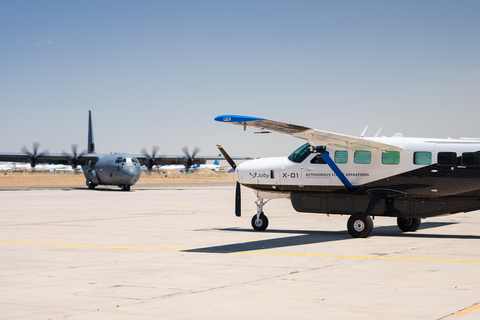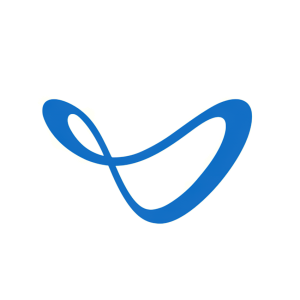Joby Demonstrates Autonomous Flight in United States Air Force ‘Agile Flag’ Exercise

Joby demonstrated autonomous airborne logistics operations during the
During the exercise, Joby’s team, which includes the autonomy division of Xwing acquired by Joby in June of this year, operated a fully autonomous Cessna 208B Grand Caravan for more than 3,900 miles of flight between military bases and public airports across
The aircraft autonomously transported essential components to restore the operational readiness of various Air Force assets, flying between 9 locations in a dynamic operational environment. The aircraft, while monitored by a safety pilot, completed a fully autonomous taxi, take-off, and landing at each location during the exercise without requiring on-the-ground infrastructure, including numerous sites that had not been previously visited by the aircraft.
Joby also showcased its ability to remotely supervise the aircraft using a laptop and a satellite communications terminal, both of which are transportable in a single backpack.
Maxime Gariel, Autonomy Lead at Joby, commented: “We were pleased to continue demonstrating the capabilities of our autonomy technology during Agile Flag 24-3, where we completed dozens of fully autonomous aerial missions and showcased an ability to perform rapid resupply. We look forward to continuing to work with the
Earlier this year, the Xwing team participated in ‘Agile Flag 24-1’, a similar exercise, completing more than 2,800 miles of fully autonomous flight and demonstrating the ability to integrate autonomous aircraft into congested airspace as well as night operations, sloped runways, and landing at airports with no infrastructure.
“The return on investment for the
The Caravan’s autonomous capabilities are enabled by a suite of technologies developed by the Xwing autonomy team, which joined Joby in June 2024, and the aircraft has completed more than 300 fully autonomous flights since 2020.
Joby’s acquisition of Xwing’s autonomy division and continued development of autonomy technology demonstrates the Company’s commitment to developing next-generation technologies which have the potential to continue to improve safety and widen access to commercial flight. Joby also expects the technology to play an important role in accelerating the execution of existing contract deliverables with the
The views expressed in this press release are those of the author and do not necessarily reflect the official policy or position of the Department of the Air Force, the Department of Defense, or the
About Joby
Joby Aviation, Inc. (NYSE:JOBY) is a
About AFRL
The Air Force Research Laboratory is the primary scientific research and development center for the Department of the Air Force. AFRL plays an integral role in leading the discovery, development, and integration of affordable warfighting technologies for our air, space and cyberspace force. With a workforce of more than 12,500 across nine technology areas and 40 other operations across the globe, AFRL provides a diverse portfolio of science and technology ranging from fundamental to advanced research and technology development. For more information, visit www.afresearchlab.com.
About AFWERX
As the innovation arm of the DAF and a directorate within the Air Force Research Laboratory, AFWERX brings cutting-edge American ingenuity from small businesses and start-ups to address the most pressing challenges of the DAF. AFWERX employs approximately 370 military, civilian and contractor personnel at five hubs and sites executing an annual
Forward Looking Statements
This press release contains “forward-looking statements” within the meaning of the “safe harbor” provisions of the Private Securities Litigation Reform Act of 1995, including but not limited to, statements regarding the development and performance of our aircraft, the growth of our manufacturing capabilities, our regulatory outlook, progress and timing; our planned operations with the Department of Defense, including the timing of execution of existing contract deliverables and potential future contracts; our business plan, objectives, goals and market opportunity; and our current expectations relating to our business, financial condition, results of operations, prospects, capital needs and growth of our operations. You can identify forward-looking statements by the fact that they do not relate strictly to historical or current facts. These statements may include words such as “anticipate”, “estimate”, “expect”, “project”, “plan”, “intend”, “believe”, “may”, “will”, “should”, “can have”, “likely” and other words and terms of similar meaning in connection with any discussion of the timing or nature of future operating or financial performance or other events. All forward looking statements are subject to risks and uncertainties that may cause actual results to differ materially, including: our ability to launch our air taxi service and the growth of the urban air mobility market generally; our ability to produce aircraft that meet our performance expectations in the volumes and on the timelines that we project; the competitive environment in which we operate; our future capital needs; our ability to adequately protect and enforce our intellectual property rights; our ability to effectively respond to evolving regulations and standards relating to our aircraft; our reliance on third-party suppliers and service partners; uncertainties related to our estimates of the size of the market for our service and future revenue opportunities; and other important factors discussed in the section titled “Risk Factors” in our Annual Report on Form 10-K, filed with the Securities and Exchange Commission (the “SEC”) on February 27, 2024, and in future filings and other reports we file with or furnish to the SEC. Any such forward-looking statements represent management’s estimates and beliefs as of the date of this release. While we may elect to update such forward-looking statements at some point in the future, we disclaim any obligation to do so, even if subsequent events cause our views to change.
View source version on businesswire.com: https://www.businesswire.com/news/home/20240826928839/en/
Joby Aviation
Investors:
investors@jobyaviation.com
Media:
press@jobyaviation.com
Source: Joby Aviation, Inc.







